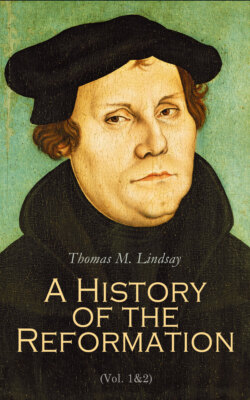Читать книгу A History of the Reformation (Vol. 1&2) - Thomas M. Lindsay - Страница 69
На сайте Литреса книга снята с продажи.
§ 2. The Emperor Charles v.
ОглавлениеTable of Contents
Aleander was not the real antagonist of Luther at Worms; he was not worthy of the name. The German Diet was the scene of a fight of faiths; and the man of faith on the mediæval side was the young Emperor. He represented the believing past as Luther represented the believing future.182 “What my forefathers established at Constance and other Councils,” he said, “it is my privilege to uphold. A single monk, led astray by private judgment, has set himself against the faith held by all Christians for a thousand years and more, and impudently concludes that all Christians up till now have erred. I have therefore resolved to stake upon this cause all my dominions, my friends, my body and my blood, my life and soul.”183 The crisis had not come suddenly on him. As early as May 12th, 1520, Juan Manuel, his ambassador at Rome, had written to him asking him to pay some attention to “a certain Martin Luther, who belongs to the following of the Elector of Saxony,” and whose preaching was causing some discontent at the Roman Curia. Manuel thought that Luther might prove useful in a diplomatic dispute with the Curia.184 Charles had had time to think over the matter in his serious, reserved way; and this was the decision he had come to. The declaration was all the more memorable when it is remembered that Charles owed his election to that rising feeling of nationality which supported Luther,185 and that he had to make sure of German assistance in his coming struggle with Francis i. A certain grim reality lurked in the words, that he was ready to stake his dominions on the cause he adopted. There is much to be said for the opinion that “the Lutheran question made a man of the boy-ruler.”186
On the other hand, it is well to remember that the young Emperor did not take the side of the Pope nor commit himself to the Curial ideas of the absolute character of papal supremacy. He laid stress on the unity of the Catholic (mediæval) Church, on the continuity of its rites, and on the need of maintaining its authority; but the seat of that authority was for him a General Council. The declaration in no way conflicts with the changes in imperial policy which may be traced during the opening weeks of the Diet, nor with that future action which led to the Sack of Rome and to the Augsburg Interim (1548). It is possible that the young ruler had read and admired Luther's earlier writings, and that he had counted on him as an aid in bringing the Church to a better condition. It is more than probable that he already believed that it was his duty to free the Church from the abuses which abounded;187 but Luther's fierce attack on the Pope disgusted him, and a reformation which came from the people threatened secular as well as ecclesiastical authority. He had made up his mind that Luther must be condemned, and told the German princes that he would not change one iota of his determination. But this did not prevent him making use of Luther to further his diplomatic dealings with the Pope and wring concessions from the Curia. For one thing, the Pope had been interfering with the Inquisition in Spain, trying to mitigate its severity; and Charles, like his maternal grandfather, Ferdinand of Aragon, believed that the Holy Office was a help in curbing the freedom-loving people of Spain, and had no wish to see his instrument of punishment made less effectual. For another, it was evident that Francis i. was about to invade Italy, and Charles wished the Pope to take his side. If the Pope gave way to him on both of these points, he was ready to carry out his wishes about Luther as far as that was possible.188
